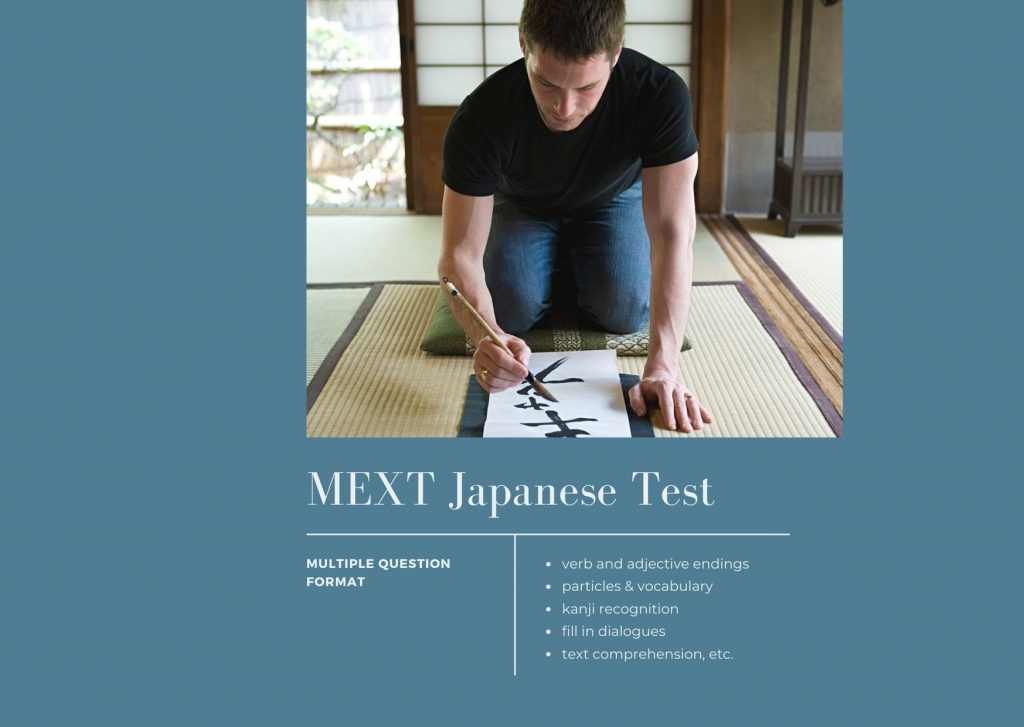MEXT Japanese test skills

No matter if you are applying for the undergraduate scholarship or research scholarship, the Japanese language is essential. Both undergrad and research students will have to go through a MEXT Japanese test at the beginning of the MEXT application.
Why you need the Japanese language:
– MEXT Japanese test
– Preparatory course/ research course
– Admission exam/ EJU exam
– School life/ Daily life
First of all, you need the Japanese to apply for the MEXT scholarship. The Japanese test takes 2 hours and involves more than casual conversation. You need grammar, vocabulary, and kanji knowledge to obtain a good score.
When you arrive in Japan, you are enrolled in an undergraduate preparatory course (1 year) or a research course (2 years). Students must take compulsory Japanese language courses and must improve their Japanese during this time.
At the end of this period, there will be a university admission exam, and possibly an EJU exam. Both of them are in Japanese. For research/ graduate students, it is possible to have an admission exam in English, but this depends on your field of research and university.
After you get admitted, you will start university courses, which are mostly in the Japanese language. You will have to make presentations, summaries, and reports in Japanese. The most troublesome for me was the school forms, as there is a lot of unavoidable bureaucracy. For research students, your relationship with your supervisor will depend on your capability of having a clear communication in Japanese.
You will need Japanese for routine activities, like shopping, opening a bank account, renting an apartment, finding a job, etc. Casual conversation is enough here.
What Japanese levels should you aim for?
Undergrad students need more Japanese than research students. Students who apply for the undergraduate MEXT program should start learning the Japanese language well in advance before applying for the scholarship. You should reach level N2-N1 before you take the MEXT Japanese test.
For the MEXT research scholarship students (graduate program), learning Japanese is not essential, especially if you intend to study in the English language. But you still need to handle mundane tasks in Japanese. You should aim for level N4-N3 before you take the MEXT test.
MEXT Japanese test format
This test is compulsory for all students who apply for the MEXT scholarship. It is a multiple question format with three main parts: A, B, C. Part A is elementary level, Part B is an intermediate level, and Part C is an advanced level. Each section contains five exercises, so there is a total of 15 activities. The first two parts (A and B) contain furigana; the third part, C, doesn’t contain furigana.
There is a wide array of test topics, including particles, verb, and adjective endings, vocabulary, kanji recognition, fill in dialogues, text comprehension, expressions, and others.
There is no listening or speaking test. You only have to read and select the correct answers. The exception is the kanji exercise, where you have to know and write the kanji or furigana.
Conclusion
Although it is possible to get by without the Japanese language, knowing it will make life much more comfortable. Especially when you have to fill out different university forms or read and summarize chapters for your school presentations. Not just conversational Japanese, but reading skills (kanji) and vocabulary.
If you want to prepare for the MEXT Japanese test, you can check out my e-books. The guidebooks for both undergraduate and research scholarships come with the Japanese tests for nine years. The more you practice, the more your chances of obtaining the MEXT scholarship will increase.
Please leave a comment below if you enjoyed this article, if you have any questions or if you have any suggestions.

Thank you so much for this information. I want to prepare for this test so what way of learning do you advice me (hiragana, kanji or katakana)? especially according to this mext Japanese test.
You need to master hiragana first and then katakana. After you are familiar and used to these two writing systems, you have to start learning Kanji – level 1, 2, and so on. Start with the easy ones and always learn them in context (within a simple text). You can find some samples of Japanese lessons on the blog – in the Japanese game section. I will put something level N5 soon, to be easy.
This information is so useful for someone like me that dreams and trying to attend Japanese university as a research applicant. Thank you very much, and wish me luck in Kyoto University. 🙂
Best of luck! Let us know how it goes! 🙂
As a Research application, do you have to attempt all three sections of the Japanese exam: Elementary, Intermediate & Advanced?
Yes, you have to do as much as possible. Don’t leave any exercise, not even if you don’t know the answer.
Thank you very much for guide it is very useful)
You’re welcome! Good luck with your studies!